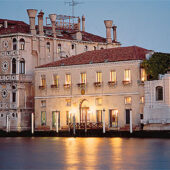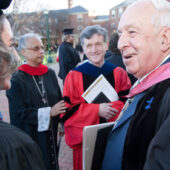A ‘life-changing’ experience: How students can make the most out of studying abroad
 Whether in Venice or Vietnam, Steve Duke, director of the Center for International Studies, advises students to go beyond being tourists to interact in significant ways with those who live in the country they are visiting. Making cultural connections is what makes study abroad the most meaningful, he says.
Whether in Venice or Vietnam, Steve Duke, director of the Center for International Studies, advises students to go beyond being tourists to interact in significant ways with those who live in the country they are visiting. Making cultural connections is what makes study abroad the most meaningful, he says.Categories: Experiential Learning, Global Wake Forest

 Choosing to attend Wake Forest wasn't taking the easy road in life, senior Kate Miners said in her senior oration at Founders' Day Convocation on Feb. 18.
Choosing to attend Wake Forest wasn't taking the easy road in life, senior Kate Miners said in her senior oration at Founders' Day Convocation on Feb. 18.  "The Threepenny Opera," written in Germany over 80 years ago, has a lot to say about unscrupulous behavior in any era. This operetta of power and corruption, written by poet and playwright Bertolt Brecht, proves the world is only one scoundrel away from the next $65 billion Bernie Madoff-style Ponzi scheme.
"The Threepenny Opera," written in Germany over 80 years ago, has a lot to say about unscrupulous behavior in any era. This operetta of power and corruption, written by poet and playwright Bertolt Brecht, proves the world is only one scoundrel away from the next $65 billion Bernie Madoff-style Ponzi scheme. When Zahir Rahman addresses the Founders' Day Convocation audience on Feb. 18 his topic will be, appropriately enough, "We are Wake Forest." Rahman is one of three finalists in the 2010 Senior Colloquium who will read their essays at convocation. Provost Emeritus Ed Wilson ('43) will speak on the history of senior orations at the event, which begins at 4 p.m. in Wait Chapel.
When Zahir Rahman addresses the Founders' Day Convocation audience on Feb. 18 his topic will be, appropriately enough, "We are Wake Forest." Rahman is one of three finalists in the 2010 Senior Colloquium who will read their essays at convocation. Provost Emeritus Ed Wilson ('43) will speak on the history of senior orations at the event, which begins at 4 p.m. in Wait Chapel. In Santarem, one of the poorest regions of Brazil, children go to school for only half the day; the rest of the day, many have no place to go but the streets. Wake Forest students spent two weeks over winter break helping construct a community center to give these children a safe place.
In Santarem, one of the poorest regions of Brazil, children go to school for only half the day; the rest of the day, many have no place to go but the streets. Wake Forest students spent two weeks over winter break helping construct a community center to give these children a safe place.